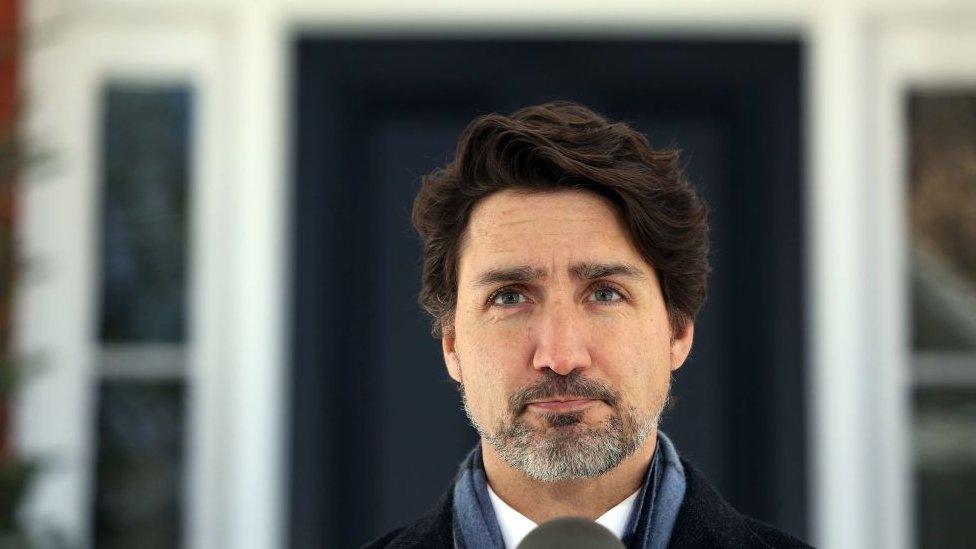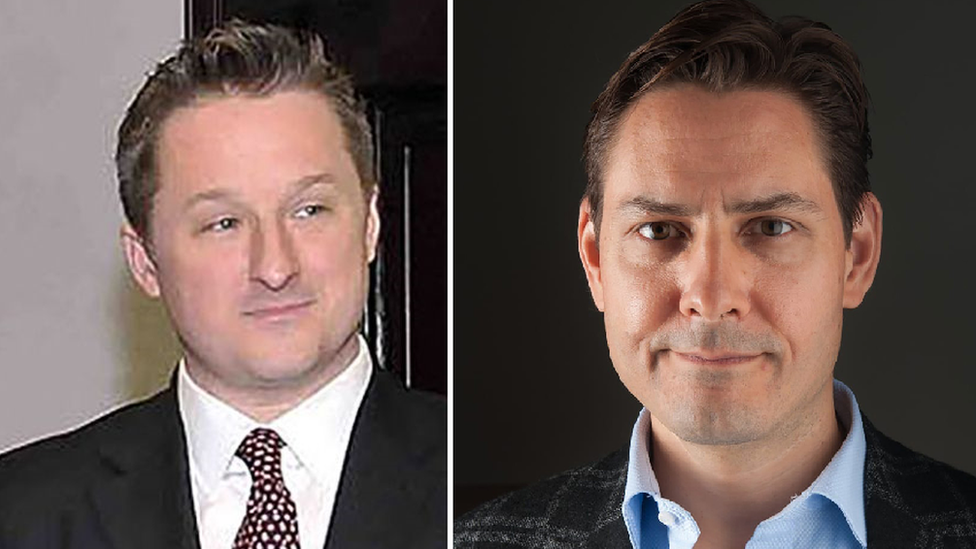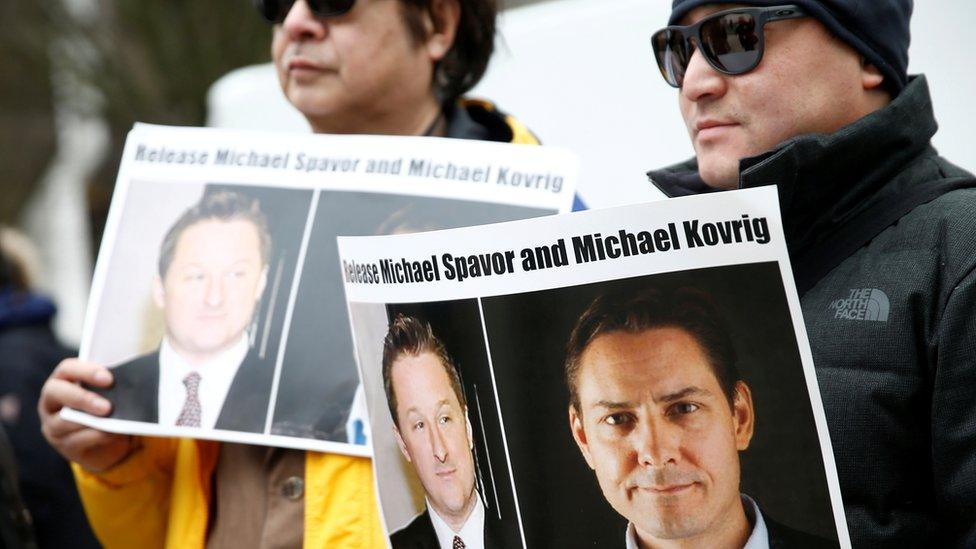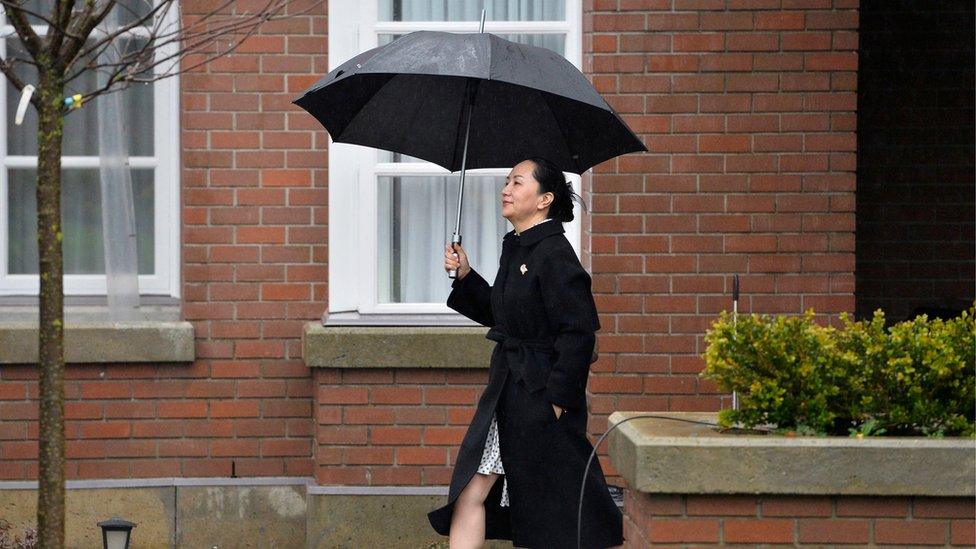Meng Wanzhou: Trudeau rejects calls to release top Huawei executive
- Published

Prime Minister Justin Trudeau is facing pressure to secure the release of the two detained Canadians
Canada's prime minister is rejecting calls to step in to end the extradition trial of a Chinese Huawei executive.
Justin Trudeau said doing so would "imperil" Canadians abroad by opening them to potential random detention.
Two Canadians were detained shortly after Meng Wanzhou, Huawei's chief financial officer, was arrested in Vancouver on request from the US.
Michael Kovrig, a former diplomat, and Michael Spavor, a businessman, have been held in China since December 2018.
Their arrests came just days after Ms Meng's detention in what has been seen by critics as an act of "hostage diplomacy".
Canada calls their arrests "arbitrary", and on Thursday, Mr Trudeau said there was a "direct link", but China has denied they were retaliation for Ms Meng's detention.
Her arrest has soured Canada-China relations.
American authorities accuse her of breaking Iranian sanctions and she is currently fighting extradition to the US.
Last week, China charged the Mr Kovrig and Mr Spavor with spying, more than 18 months after they were detained.
What did Trudeau say?
"We deplore what China did" in detaining the two men, Mr Trudeau said on Thursday.
But he told journalists in Ottawa that if a foreign power thinks it can exert political pressure on Canada by detaining its citizens "all Canadians that are travelling internationally become vulnerable".

Michael Spavor (L) and Michael Kovrig have been held since December 2018
Mr Trudeau was responding to pressure from a group of prominent former Canadian parliamentarians and diplomats, and from some family members of the detained men, to end Ms Meng's extradition proceedings.
In a letter to Mr Trudeau, made public by Canada's public broadcaster CBC, the group said: "The two Michaels were taken in direct retaliation for the arrest in Canada of Meng Wanzhou."
"We believe that the two Michaels will remain in their Chinese prison cells until Meng is free to return to China."
While they said it "does not sit well with anyone to yield to bullying or blackmail...resisting China's pressure is no guarantee that it will never be applied again in the future".
Mr Trudeau has also faced calls to take more punitive measures, including sanctions on Chinese officials.
What has China said?
China has called Ms Meng's case "a serious political incident" and have called for her immediate release.
Beijing has not explicitly linked her arrest to the two Canadians detained, though their cases are often raised jointly by China foreign ministry spokespeople.
On Wednesday, spokesman Zhao Lijian said Chinese authorities had seen reports that Mr Kovrig's family had obtained a legal opinion indicating Canada's justice minister had the authority to stop Ms Meng extradition process at any point.
"Such options are within the rule of law and could open up space for resolution to the situation of the two Canadians," he said.
What's the background?
Meng Wanzhou - the chief financial officer of Chinese tech giant Huawei, and daughter of the company's founder - was arrested on 1 December 2018 in Vancouver.

People protest outside Meng Wanzhou's extradition hearing in Canada
Her arrest was requested by the US justice department, which accused her of breaking Iranian sanctions. She is still fighting extradition to the US.
The US has labelled Huawei a security risk and banned the sale of its products. US politicians are also pushing allies, including Canada, to block Huawei from their markets.
Huawei has said it has trust in Canada's judicial system, "which will prove Ms Meng's innocence".
Last month, a Canadian court ruled that her case could go forward.
On 10 December 2018, the two Canadians were detained in China. They were formally arrested in May 2019.
Canada is using both public and private pressure to secure their release, Mr Trudeau has said, and has pressed many of its allies to speak in support of Mr Spavor and Mr Kovrig, including Australia, France, Germany, Spain, and the UK.
On Monday, US Secretary of State Mike Pompeo called the charges against the two men "politically motivated and completely groundless".
- Published19 June 2020

- Published19 June 2020

- Published27 May 2020
